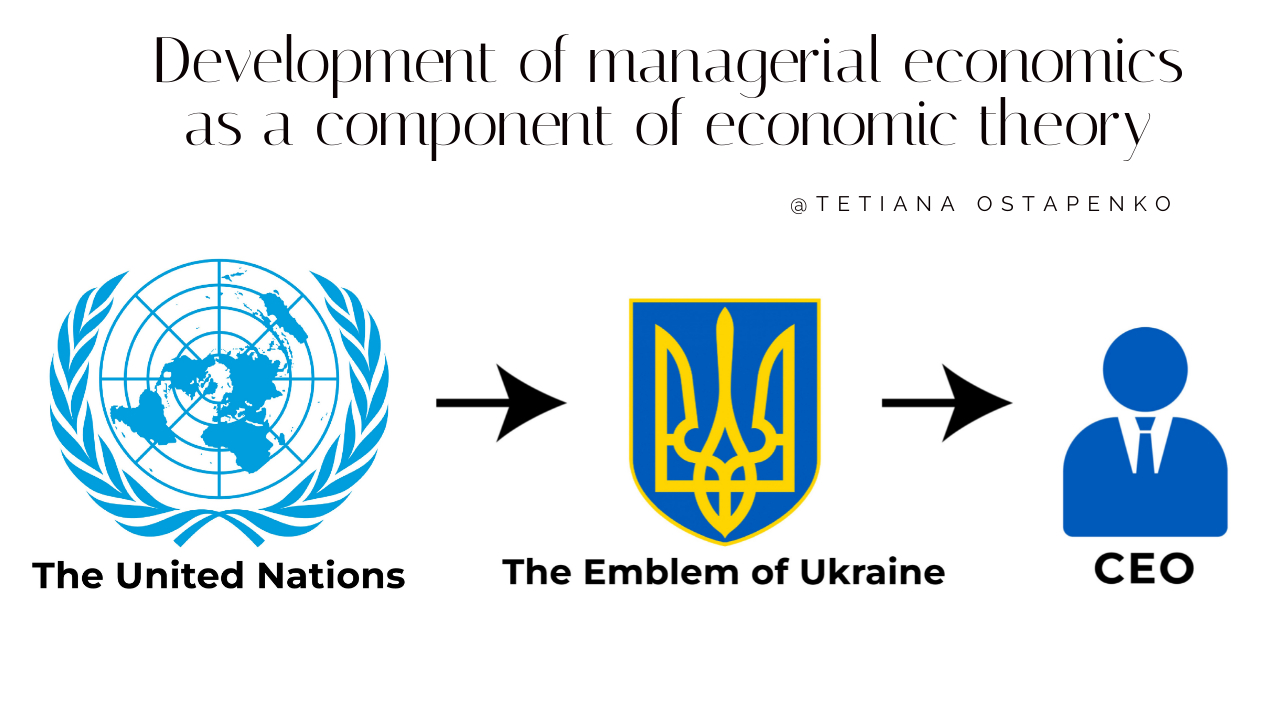Development of managerial economics as a component of economic theory
DOI:
https://doi.org/10.15587/2706-5448.2024.307356Keywords:
managerial economics, system of managerial economics, international relations, macro level of economic relationsAbstract
The object of research is managerial economics, which is considered as a component of economic theory. The scientific problem is that there are such concepts as management and managerial economics, which are tangential and somewhat overlapping. Managerial economics is included in the structure of the economic system as a separate component. It is also proven that managerial economics is a systemic entity and has the following levels: global, macro-, meso-, micro- and nano-. The study defined these levels and outlined the use of the global (international) and macro levels. Analysis of these categories is necessary for understanding the governance and governance conditions of global and national economies. The essence of the obtained results is that the existing system of managing international relations is inflexible and difficult to solve the global problems of humanity. And the management of national economies must correspond to the strategic development plans of a particular nation. These obtained results can be explained by the immobility of management structures and the need to revise the global economic order. At the state level, there should be levers for regulating economic relations.
It was noted in the work that society is a set of people united at a certain stage of historical development by one or another economic relations that determine all other social relations. The economic life of society consists of various phenomena and processes, the essence of which must be sought in social production. The concept of «managerial economics» is often used to characterize the regulation of social production. There are different approaches to defining the content of managerial economics. First, managerial economy is considered as regulation by a set of industries and types of material production. Secondly, a system of regulation of productive forces and production relations is usually associated with managerial economics. Thirdly, managerial economics regulates the conditions for achieving equilibrium and cyclicality of social production.
References
- Maiier, D. M., Raukh, D. E.; Filipenko, A. (Ed.) (2003). Osnovni problemy ekonoimky rozvytku. Kyiv: Vyd-vo «Lybid», 684.
- Bykova, V. H. (2008). Otsinka upravlinnia ta finansovo-ekonomichnym potentsialom pidpryiemstv zahalnoderzhavnoho znachennia. Dnipropetrovsk: Nauka i osvita, 108.
- Verkhohliadova, N. I., Ivannikova, N. A., Lavrinchenko, O. V. (2007). Upravlinnia trudovym potentsialom pidpryiemstv 6 monohrafiia. Dnipropetrovsk: Porohy, 284.
- Hlovkova, L. S. (2009). Sukupnyi ekonomichnyi potentsial korporatsii: formuvannia ta rozvytok. Zaporizhzhzia: Vyd-vo KPU, 340.
- Hryhoriava, L. V. (2011). Formuvannia struktury marketynhovoho potentsialu pidpryiemstv lehkoi promyslovosti. Ternopil: TzOV «Terno-hraf», 344.
- Hudzynskyi, O. D., Sudomyr, S. M., Hurenko, T. O. (2010). Upravlinnia formuvanniam konkurentospromozhnoho potentsialu pidpryiemstva (teoretyko-metodolohichnyi aspekt). Kyiv: IPZ DSZU, 212.
- Shubalyi, O. (2023). Transformatsiia pryntsypiv povedinkovoi ta upravlinskoi ekonomiky v umovakh viiny, yevrointehratsii ta adaptatsii zmin klamatu. Eknonomichnyi forum, 1 (3), 40–47. doi: https://doi.org/10.36910/6775-2308-8559-2023-3-5
- Kravchenko, M., Holiuk, V. (2022). Management decisions making: essence and current development trends. Economy and Society, 40, 37–40. doi: https://doi.org/10.32782/2524-0072/2022-40-37
- Fahrurrozi, M. (2021). Managerial Economics in Managerial Decision Making. Turkish Online Journal of Qualitative Inquiry, 12 (5/11), 69–77.
- Samuelson, I., Marks, G., Zagorsky, J. (2021). Managerial Economics. Hoboken: Wiley, 365.
- Storoianska, I. Z., Benovska, L. Ya. (2022). Povedinkovi faktory u pryiniatti finansovo-ekonomichnykh rishen subiektamy ekonomiky v umovakh nevyznachenosti. Finansy Ukrainy, 6, 112–128.
- Bitiuk, I. (2023). National economic interests: principles of management diagnostics of the economic security of the country in the conditions of the information economy. Entrepreneurship and Trade, 38, 13–18. https://doi.org/10.32782/2522-1256-2023-38-02
- Khmarska, I., Kucheriava, K., Klimova, I. (2022). Features of the post-war recovery of the economy of Ukraine. Economy and Society, 42. doi: https://doi.org/10.32782/2524-0072/2022-42-31
- Koliadenko, С. В. (2023). National Economic Interests of Ukraine: Concepts of Changes in the Information Economy and Activation of Regional Cluster Formation. Problems of Modern Transformations. Series: Economics and Management, 9, 23–31. doi: https://doi.org/10.54929/2786-5738-2023-9-03-08
- Finahina, O., Buriak, E., Zaporozhets, O. (2021). Klastrena polityka Ukrainy: tsilovi interesy rehioniv ta rozvytok upravlinskoho seredovyshcha. Zbirnyk naukovykh prats Cherkaskoho derzhavnoho tekhnolohichnoho universytetu. Seriia Ekonomichni nauky, 62 (1), 70–79.

Downloads
Published
How to Cite
Issue
Section
License
Copyright (c) 2024 Tetiana Ostapenko

This work is licensed under a Creative Commons Attribution 4.0 International License.
The consolidation and conditions for the transfer of copyright (identification of authorship) is carried out in the License Agreement. In particular, the authors reserve the right to the authorship of their manuscript and transfer the first publication of this work to the journal under the terms of the Creative Commons CC BY license. At the same time, they have the right to conclude on their own additional agreements concerning the non-exclusive distribution of the work in the form in which it was published by this journal, but provided that the link to the first publication of the article in this journal is preserved.







